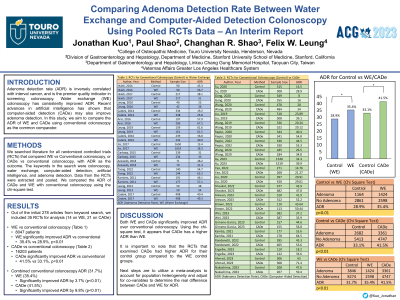Tuesday Poster Session
Category: Colorectal Cancer Prevention
P3168 - Comparing Adenoma Detection Rate Between Computer-Aided Detection and Water Exchange Colonoscopy Using Pooled RCTs Data – An Interim Report
Tuesday, October 24, 2023
10:30 AM - 4:00 PM PT
Location: Exhibit Hall

Has Audio

Jonathan Kuo, MS
Touro University Nevada
Henderson, NV
Presenting Author(s)
Paul P. Shao, MD1, Jonathan Kuo, MS2, Changhan R. Shao, MBBS3, Felix W. Leung, MD, FACG4
1Stanford University, Redwood City, CA; 2Touro University Nevada, Henderson, NV; 3Linkou Chang Gung Memorial Hospital, Taoyuan City, Taoyuan, Taiwan; 4Sepulveda ACC/VAGLAHS/UCLA, North Hills, CA
Introduction: Adenoma detection rate (ADR) is inversely correlated with interval cancer and is an important quality indicator in colonoscopy. Water exchange (WE) colonoscopy has consistently improved adenoma detection in multiple randomized controlled trials. Advance in artificial intelligence has enabled computer-aided detection (CADe) of lesions during colonoscopy. CADe has been shown to improve adenoma detection. In our study, we aimed to compare the ADR of WE and CADe using conventional colonoscopy as the common comparator.
Methods: The literature was searched for randomized controlled trials (RCTs) comparing either WE or CADe with conventional colonoscopy and reported ADR as an outcome. The keywords colonoscopy, water exchange, computer-aided detection, artificial intelligence, and adenoma detection were used in the search. Data from the RCTs were extracted and pooled. We compared the ADR of CADe and WE with conventional colonoscopy using the chi-square test.
Results: 278 articles were identified in the initial keyword search. A total of 32 RCTs, including 14 on WE and 18 on CADe were included in the analysis. In the first cohort, 8047 patients underwent either WE or conventional colonoscopy. WE significantly improved ADR compared to conventional colonoscopy (35.4 vs 28.9, p< 0.01). In the second cohort, 14942 patients underwent either CADe or conventional colonoscopy. The ADR for CADe was significantly higher than conventional colonoscopy (39.8 vs 31.7, p< 0.01). The combined ADR for conventional colonoscopy was 30.6. Compared to the combined conventional colonoscopy, WE significantly improved ADR by 4.8% (p< 0.01) and CADe significantly improved ADR by 9% (p< 0.01).
Discussion: In this interim analysis, both WE and CADe significantly improved ADR compared with conventional colonoscopy. CADe appeared to have higher ADR than WE. However, the RCTs examining CADe had higher ADR for their control group compared with the control group in WE RCTs. Future report will utilitze meta-analysis with random effect model to account for population heterogeneity and adjust for co-variables to better elucidate the real difference in ADR between WE and CADe.
Disclosures:
Paul P. Shao, MD1, Jonathan Kuo, MS2, Changhan R. Shao, MBBS3, Felix W. Leung, MD, FACG4. P3168 - Comparing Adenoma Detection Rate Between Computer-Aided Detection and Water Exchange Colonoscopy Using Pooled RCTs Data – An Interim Report, ACG 2023 Annual Scientific Meeting Abstracts. Vancouver, BC, Canada: American College of Gastroenterology.
1Stanford University, Redwood City, CA; 2Touro University Nevada, Henderson, NV; 3Linkou Chang Gung Memorial Hospital, Taoyuan City, Taoyuan, Taiwan; 4Sepulveda ACC/VAGLAHS/UCLA, North Hills, CA
Introduction: Adenoma detection rate (ADR) is inversely correlated with interval cancer and is an important quality indicator in colonoscopy. Water exchange (WE) colonoscopy has consistently improved adenoma detection in multiple randomized controlled trials. Advance in artificial intelligence has enabled computer-aided detection (CADe) of lesions during colonoscopy. CADe has been shown to improve adenoma detection. In our study, we aimed to compare the ADR of WE and CADe using conventional colonoscopy as the common comparator.
Methods: The literature was searched for randomized controlled trials (RCTs) comparing either WE or CADe with conventional colonoscopy and reported ADR as an outcome. The keywords colonoscopy, water exchange, computer-aided detection, artificial intelligence, and adenoma detection were used in the search. Data from the RCTs were extracted and pooled. We compared the ADR of CADe and WE with conventional colonoscopy using the chi-square test.
Results: 278 articles were identified in the initial keyword search. A total of 32 RCTs, including 14 on WE and 18 on CADe were included in the analysis. In the first cohort, 8047 patients underwent either WE or conventional colonoscopy. WE significantly improved ADR compared to conventional colonoscopy (35.4 vs 28.9, p< 0.01). In the second cohort, 14942 patients underwent either CADe or conventional colonoscopy. The ADR for CADe was significantly higher than conventional colonoscopy (39.8 vs 31.7, p< 0.01). The combined ADR for conventional colonoscopy was 30.6. Compared to the combined conventional colonoscopy, WE significantly improved ADR by 4.8% (p< 0.01) and CADe significantly improved ADR by 9% (p< 0.01).
Discussion: In this interim analysis, both WE and CADe significantly improved ADR compared with conventional colonoscopy. CADe appeared to have higher ADR than WE. However, the RCTs examining CADe had higher ADR for their control group compared with the control group in WE RCTs. Future report will utilitze meta-analysis with random effect model to account for population heterogeneity and adjust for co-variables to better elucidate the real difference in ADR between WE and CADe.
Disclosures:
Paul Shao indicated no relevant financial relationships.
Jonathan Kuo indicated no relevant financial relationships.
Changhan Shao indicated no relevant financial relationships.
Felix Leung indicated no relevant financial relationships.
Paul P. Shao, MD1, Jonathan Kuo, MS2, Changhan R. Shao, MBBS3, Felix W. Leung, MD, FACG4. P3168 - Comparing Adenoma Detection Rate Between Computer-Aided Detection and Water Exchange Colonoscopy Using Pooled RCTs Data – An Interim Report, ACG 2023 Annual Scientific Meeting Abstracts. Vancouver, BC, Canada: American College of Gastroenterology.
